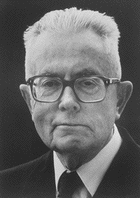| Profile | Major Works | Resources |
Maurice Allais, 1911-2010

An independent-minded French economist, Maurice Félix Charles Allais strove to carry the message of the original Lausanne School of Walras and Pareto into the modern era, through what we have called the Paretian Revolution of the 1930s. Maurice Allais wrote two major treatises in the 1940s, Á la Recherche d'une discipline économique (1943, reprinted 1952) and Economique et interet (1947) whose inspiration was to a great part derived "from meditation upon the works of Leon Walras, Irving Fisher and especially Vilfredo Pareto, three great masters who deeply influenced me" (Allais, 1992). As a later commentator put it, had Allais written these two works in English, "a whole generation of economic theory would have taken a different course" (Samuelson, 1983).
In his 1943 opus, Allais provided the groundwork for much of the Paretian system, including the first proofs of the Fundamental Welfare Theorems in both a static and intetemporal framework. He went on to unveil what are now standard ideas about market failures in a general equilibrium setting. Recognizing the potential implications of natural monopolies, transactions costs and unnatural rents on market efficiency, Allais made several quite "radical" policy proposals. His affinity to the old Lausanne school extended to the points on policy, e.g. sharing the latter's call for the complete nationalization of land and massive income redistribution by capital taxation.
Allais's work on intertemporal equilibrium and capital were extended in his 1947 book and further developed in other articles (1960, 1962, 1965, 1967). Among his contributions in 1947 was the invention of the now-famous "overlapping generations" (OLG) model (before Samuelson). Allais also introduced the "Golden Rule" for optimal growth (long before Phelps, but after von Neumann). The Baumol transactions demand for money rule was also anticipated by Allais in 1947.
The contribution Allais is generally best known for in the Anglo-Saxon world is the "Allais Paradox" in the theory of choice under uncertainty - which he presented in a series of papers in 1953. Succinctly, the paradox claims that the assumptions made in conventional expected utility theory contradict real life decisions - specifically, Allais finds behavior which contradicts the expected utility rule. The idea introduced by Allais is that there is a systematic relationship between the an agent's attitude towards risk and the "degree of certainty", what was later called the "common consequence effect". Discovering this paradox, Allais led the way to new attempts at formulating new theories of decision-making under uncertainty (e.g. 1983, 1984, 1986, 1988, 1991).
In his earlier 1943 book, Allais's introduced several other advances in general equilibrium theory besides welfare theory and the concept of an intetemporal equilibrium: namely, he introduced a unique non-tatonnement process of stability without interim prices. In 1971 and after, Allais called for a re-examination of the foundations of the Neo-Walrasian economics he had helped create, proposing instead a theory of "markets economies" relying on his 1943 process. This process relied on the "search for surplus" in exchange, which eschewed the concept of price as a guiding principle. Equilibrium, Allais claimed, is achieved when surpluses are exhausted and only then can prices be deemed to exist. His theory of surpluses and markets is best outlined in his 1989 treatise, Théorie Générale des Surplus (see also 1973, 1981, 1986, 1987).
Allais's legacy is mixed. Through his two major works (1943, 1947) and as mentor of two of the most prominent pioneers of Neo-Walrasian theory, Gerard Debreu and Edmond Malinvaud, Allais channeled numerous concerns of the original Lausanne School economists into the post-war General Equilibrium program. Today, he might be best known for his development of the "Allais Paradox" in uncertainty theory, but most of Allais's highly original contributions - notably his surplus theory of exchange and stability and his unique "psychological-relativistic" theory of money (1966, 1972, 1974, 1975) - have been either completely ignored or surreptitiously stolen by the mainstream economics establishment without due acknowledgement. His calls for a re-examination of the foundations of Neo-Walrasian theory and his single-handed attempts to reform it have only recently gotten wider attention.
Nonetheless, despite the numerous setbacks during his professional career, Maurice Allais was vindicated by being made an officer of the Legion of Honor in 1977 and a richly- deserved Nobel Memorial prize in 1988. It perhaps also should be mentioned that while Allais's contributions to economics have only been reluctantly recognized, his contributions to physics and history have been better acknowledged!
A graduate of the the École Polytechnique and the École Nationale Supérieure des Mines (ENSM) of Paris, Allais taught at ENSM from 1944 to 1988. He was director of research at the Centre Nationale de la Recherche Scientifique (1954-80) and the Center of Monetary Analysis at the University of Paris (1970-85).
|
Major Works of Maurice Allais
|
|
HET
|
|
Resources on Maurice Allais
|
All rights reserved, Gonçalo L. Fonseca
